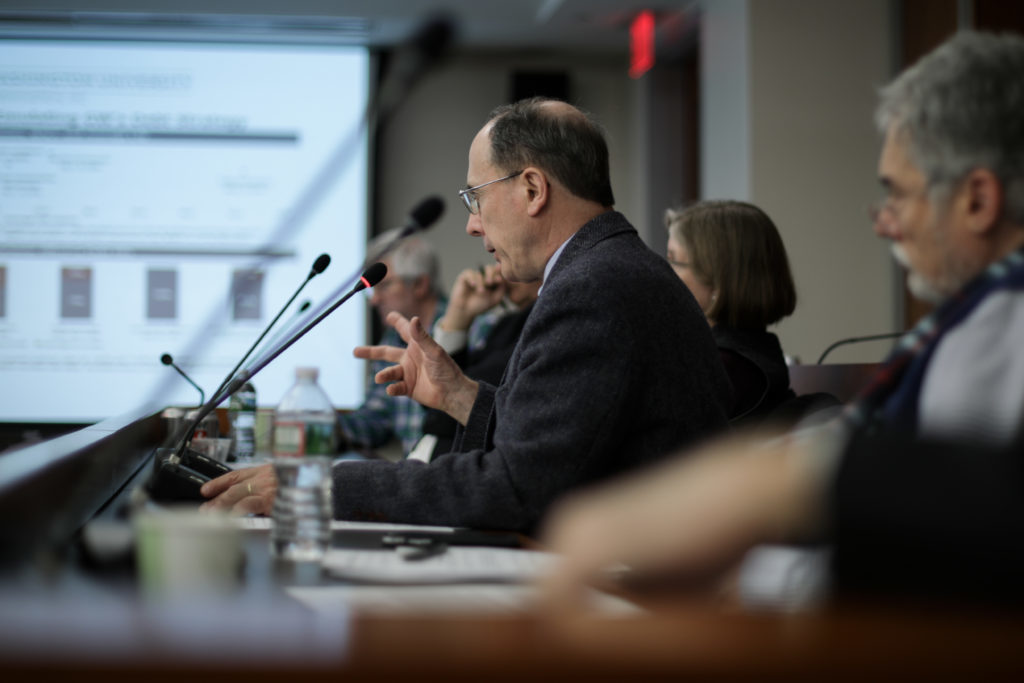The Faculty Senate unanimously passed a resolution Friday recommending new guidelines for exercising and defending academic freedom after recent political targeting and protests at GW and around the country.
The resolution urges administrators and the Board of Trustees to adopt clearer guidelines to protect academic freedom and expression for faculty. Faculty said the resolution was meant to protect scholars’ rights to express ideas without retaliation and comes after recent high-profile events in which protesters disrupted events at the University of California, Berkeley, Middlebury College and attempted to hold a protest at GW’s law school.
The resolution is also meant to address online watch lists targeting professors for alleged political biases and recent incidents at GW, when individuals allegedly recorded classes without approval from the course instructor.
The faculty code, the document that lists all rules for faculty, already outlines tenured professors’ rights to academic freedom, but faculty said they felt the protections could be more clearly defined. The resolution recommends that faculty and other members of the University community are guaranteed “the broadest possible latitude to inquire, speak, write, listen, challenge and learn.”
The resolution specifically protects the right to criticize ideas without University or outside interference, the freedom to debate and the use of “reasonable, customary and lawful measures” by the University to protect faculty.
Arthur Wilmarth, a professor of law and the chair of the Faculty Senate’s professional ethics and academic freedom committee, said at the meeting that the faculty code already fully recognizes the principles of academic freedom but that “it’s not very spelled out.” He added that the guidelines are subject to further additions that the Faculty Senate and Board of Trustees will have to sign off on in May.
“These events obviously threaten both freedom of speech and academic freedom,” he said. “A number of us faculty felt we should address that now rather than waiting for more serious problems.”
At GW, protesters not affiliated with the University attempted to block a debate on presidential powers between Jonathan Turley, a law professor, and John Yoo, a law professor at University of California, Berkeley law professor and former White House attorney who helped author “enhanced interrogation” memos during President George H.W. Bush’s administration.
Wilmarth said University staff and security quickly disbanded the protest but that the incident is an example of how interference with academic freedom can affect students’ educational opportunities. He added that students can benefit from experiencing debate and tension, even if they disagree with one side.
“I think some of us foresee that that could happen, not just at public forums and speeches but it could also happen in a classroom,” he said. “You can’t discover the truth unless you are free to seek it.”
Bill Briscoe, a professor of physics and a member of the Faculty Senate, asked at the meeting whether the new guidelines would affect students who disagree with professors in class. Wilmarth said the resolution will not interfere with students’ ability to disagree and question professors because students can express themselves without disrupting classes.
“There has to be a sense of reciprocity among all speakers on campus that within reasonable boundaries everybody should have the right to express their opinion but not in a way that disrupts or silences the ability for other people to express their opinions,” he said.
Faculty earlier expressed concerns about being targeted for alleged political bias and recorded without permission for targeting purposes at a Faculty Senate meeting in December. At last week’s meeting, faculty said the new guidelines are a step in the right direction, but that the University should send out clear rules to faculty to address concerns about being recorded.
Harald Griesshammer, a professor of physics and a member of the Faculty Senate, said there have been at least three incidents of individuals recording humanities and social sciences course lectures without the professors’ approval.
“It’s a difficult issue because we need to raise awareness for such incidents, but every time you discuss concrete examples you are also potentially setting up more surveillance of that particular faculty.”
Griesshammer added that faculty notified the University Police Department about these incidents and UPD officers have recommended that professors call the police to report similar issues in the future, instead of confronting students.
In addition to the faculty resolution, he would like the University to send a clarifying email in the next few weeks to all faculty and students about the rules for recording classes, Griesshammer said.
“If you want to record you need to let the faculty know beforehand and you might even need the consent of the whole class,” he said.





